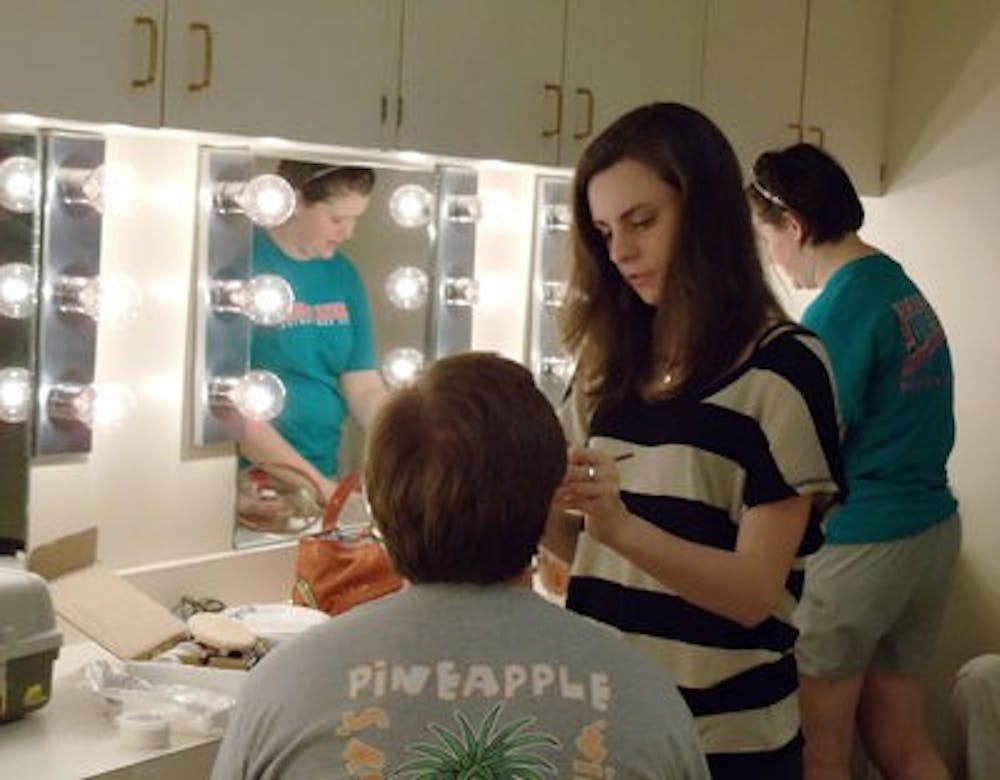Step into the actors' dressing room in the Telfair Peet Theatre on a Monday morning and you'll find blood, gore and latex--just some of the tools used by costume designer Tracy Oleinick's advanced stage makeup class.
Oleinick said since the success of competition shows such as FX's "Face Off" and gnarly dramas like "CSI," interest in working in makeup has grown.
"Several students have been able to go on to Hollywood and have been able to audition with other makeup artists and get to be either into the advanced makeup schools or in with effects artists because there's a lot of [gore] in 'CSI'--they have that need for accident victims and body parts," Oleinick said. "That's really big right now--and zombies."
Oleinick pointed out that Atlanta--the location on AMC's "The Walking Dead"--is a nearby market for talent in makeup arts.
As part of the advanced stage makeup class, students learn how transform themselves into zombies using latex molds for gruesome wounds and rotting flesh.
"We start with sculpting masks," Oleinick said. "A lot of kids have never had a chance to take an advanced art class where they even got to sculpt in clay...Then we begin casting their own faces. The plaster cast of your face is a wonderful surface to sculpt on so everything fits exactly."
After the face cast has been set, more clay is sculpted on top to exaggerate features, such as a nose or chin. Oleinick explained that the new mold is next cast in plaster, then in latex fortified with cheesecloth. The latex nose can be removed and fit perfectly to the wearer.
"All of that blood and gore and guts stuff is very popular right now, so it's gotten a lot of people through the door," Oleinick said. "They have the skills, now they just need to meet the people that will give them the job. It's very marketable right now."
After graduation, a student interested in pursuing a makeup career may go to graduate school or enter the job market in theater or film, according to Oleinick.
"You have to have a cosmetology license to work on movie sets," said Alison Hora, junior in theater. "It's going to allow me to be head of hair and wig department. Very soon, I'll be going to cosmetology school because that license is really going to push me forward and give me that extra experience and just open up a whole new spectrum of opportunities for me."
Hora, who took advanced stage makeup as a freshman, has lent her talents to Auburn theater productions, including "9 to 5: The Musical." She said her desire to work in makeup started when she was a child.
"I would spend hours in my room doing the craziest makeup on my face that I could possibly do and my hair and take pictures of myself acting like a diva," Hora said.
Meghan McCarthy, senior in theater, said she enjoys the practical approach of Oleinick's course.
"I feel like I'm actually learning skills that I want to use outside of class," McCarthy said.
The course is open to all majors and artistic expertise is not a requirement.
"I'd recommend it to anyone, even if they're not theater majors," McCarthy said. "Mrs. Tracy teaches you step by step how to do the different techniques."
Oleinick pointed out that with technological advances, the world of makeup artists is more accessible than ever before, whether or not someone is naturally artistic.
Advanced stage makeup students work actively behind the scenes of Auburn University theater productions by applying old-age makeup, mustaches or more grotesque scars and wounds.
McCarthy and her peers also work to educate actors in applying their own makeup--a valuable skill for a newly graduated acting student, according to Oleinick.
For both actors and makeup artists, the world of theater and film is always about collaboration, Hora said.
"Everyone respects each other and we all work together to make everyone else look good," Hora said.
Whether they're creating zombies or ingenues, the makeup crew's job is to bring the audience into the fantasy.
"Most people don't stay and watch the credits," Oleinick said. "There are about 10 actors, and then there's a list of 100 people. Behind the scenes--that's where the jobs are."
Do you like this story? The Plainsman doesn't accept money from tuition or student fees, and we don't charge a subscription fee. But you can donate to support The Plainsman.





